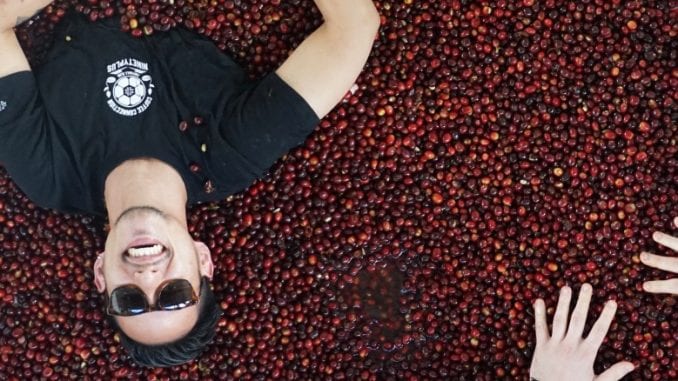
Chad Wang, the 2017 World Brewers Cup Champion, talks about the coffee he used to win the competition, why he asked the judges not to take notes, and what he learned from his third-place finish last year.
BY JOSHUA DUSK-PEEBLES
SPECIAL TO BARISTA MAGAZINE
Chad Wang isn’t a stranger to the World Brewers Cup competition. He represented Taiwan last year at the WBC in Dublin and placed third—we interviewed him here and shared his third-place recipe—but this year in Budapest, he took the top prize. Today we ask him about his winning recipe and how his performance from last year influenced this year’s championship run.
Joshua Dusk-Peebles: Chad! Congratulations on winning the World Brewers Cup this year. I really enjoyed interviewing you after your third-place finish last year, so I was excited to see that I would get a chance to do so again!
Chad Wang: Thank you.
JDP: What were some of the career benefits you experienced since doing so well last time?
CW: I’ve had a lot of opportunities to introduce myself to non-coffee professionals. This is very important for market development. This is what I will continue to do for the future, to convert more people to coffee people.
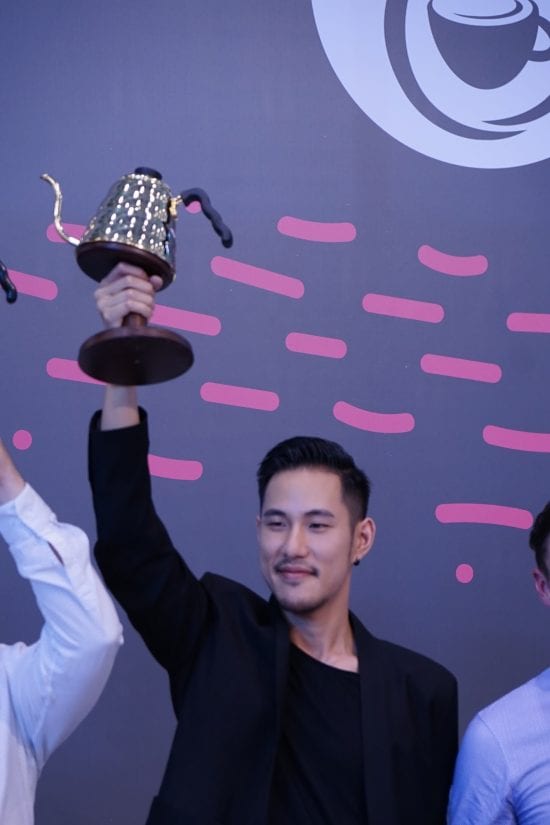
JDP: Speaking of coffee people, Ninety Plus is a company very familiar to anyone who follows world coffee competitions. You used their Gesha Estates coffee again this year, and it seems like they were 100 percent behind you. Can you talk more about your relationship with them?
CW: It is very true that I’ve had very large support from Joseph, Stefanos and Yoshikazu, all of whom are members of the Ninety Plus Makers. We are actively involved in processing at the farm level, and help in the development of new season taste profiles.
JDP: Your processing method sounds very interesting! You said during your presentation that the coffee was fermented in a glass box in a dark room and then dried for 21 days. Can you fill in more details?
CW: Actually, I did not personally process the coffee this year. The processor was Jose Alfredo, the manager at the Ninety Plus Gesha Estates. What I do know is that it was fermented under closed conditions under low temperature. We’ve come to realize over the years that cold fermentation produces acidity with a delicate and sweet quality that I find much more appealing than normal fermentation.
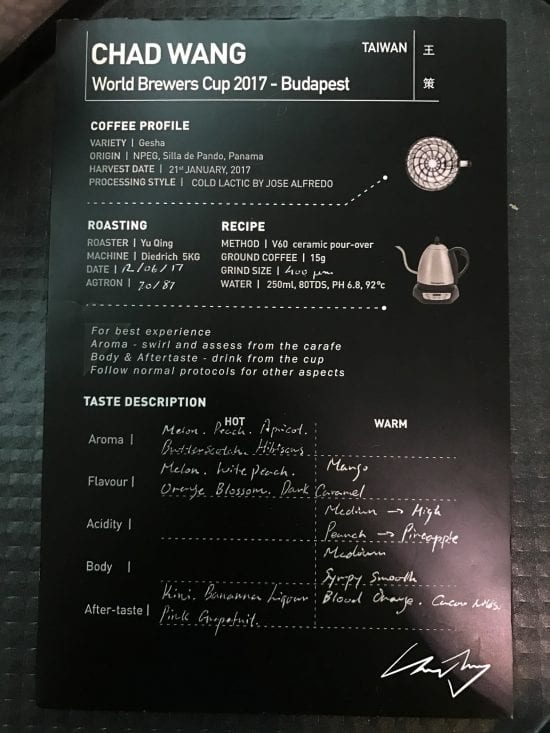
JDP: Can you walk me through your recipe preparation system? What choices did you make earlier in the process? What choices did you make later?
CW: For my open service, it was a very standard recipe of 1:16.67. When you have a good-quality Gesha, which is well roasted, it is perfectly OK to extract the coffee completely—that explains my brew ratio. I set my total brew time at two minutes, and tried different grind sizes and taste for cup quality to my standard pouring technique. It is fairly easy for open service; compulsory was the challenge.
2016 was the first year of my championship. I did not have any idea of what to expect for the compulsory coffee or compulsory grinder. I failed to find the correct grind size for my championship, and the end cup was smoky. This encouraged me to use a sift this year, to make sure that I calibrated the sponsor grinder to the grinder I used during my training by sifting and weighing.
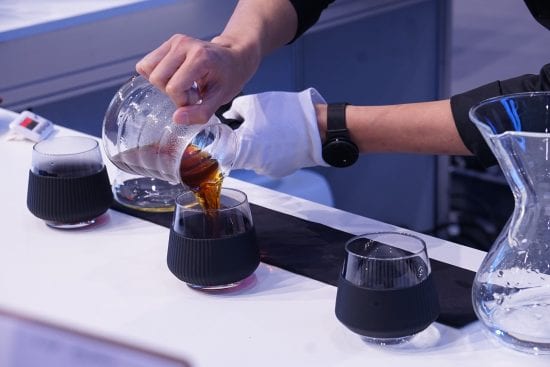
I also realized from 2016 that the coffee might be roasted darker. For darker-roasted coffee I needed a small brew ratio to have acidity, but I needed a short extraction time for a clean cup. So I tried techniques other than the V60 to find the best result. I decided on the Bonavita immersion dripper. I immersed the coffee first, to have concentration. I then filtered the coffee for a different extraction rate, which resulted in complexity.
I used an under-extracted coffee to which I added water to dilute (bypass) to a suitable concentration for consuming. During practice time I started brewing at 1:15, tasting every brew for decreased smokiness and increased acidity. I eventually tightened until 1:8, and diluted the coffee to TDS 1.45.
The 60-minute practice time really helped. None of this could have been done without getting to know the coffee and the sponsored grinder.
JDP: During your open service presentation, you encouraged the judges not to take notes. Can you elaborate on your reasoning for this?
CW: Sensory judges are busy enough as they are. With the help of the head judge and the shadow judge, I wanted the sensory judges to focus on absorbing as much of my presentation as they could, and prepare themselves to focus on the cup evaluation.
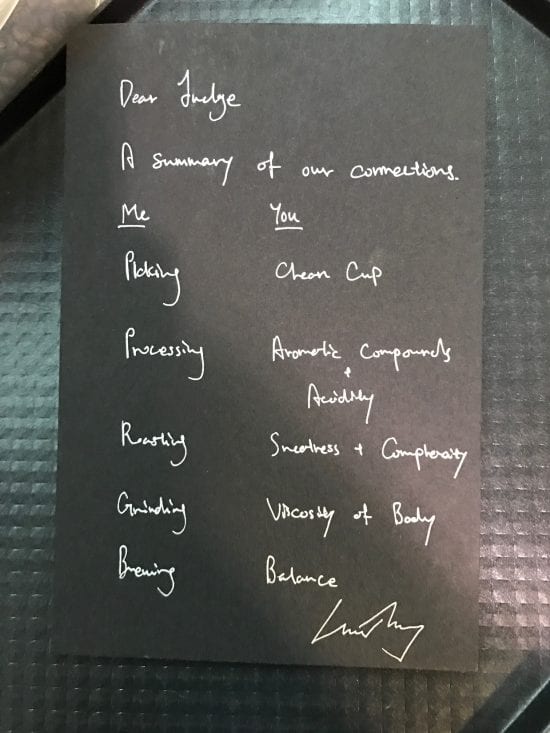
JDP: When I spoke to you last year, you mentioned the importance of positivity. How do you maintain positive energy in the face of so much pressure and intensity?
CW: Pressure and positivity are two different things and should co-exist in a healthy competitor. Of course everyone wants the gold, but just preparing yourself to give the best presentation ever will mean that you’ve won yourself. That is an example of staying positive, I think.
JDP: What’s your favorite non-caffeinated beverage? Why?
CW: I love fresh fruit juices. They are tasty and healthy!
JDP: Thanks and congratulations again, Chad! Talk to you next year!
 ABOUT THE AUTHOR
ABOUT THE AUTHOR
Joshua Dusk-Peebles works as a technician and educator for Counter Culture Coffee in Chicago. He loves exploring, experimenting, learning, and sharing what he has discovered with others. Before falling into the world of coffee, he spent time working as a diesel mechanic, an itinerant preacher, a bike messenger, and a vegan cook. Nothing makes him happier than an outdoor adventure with his family. He can be reached at dusk.peebles@yahoo.com or found online at duskcoffee.com.

